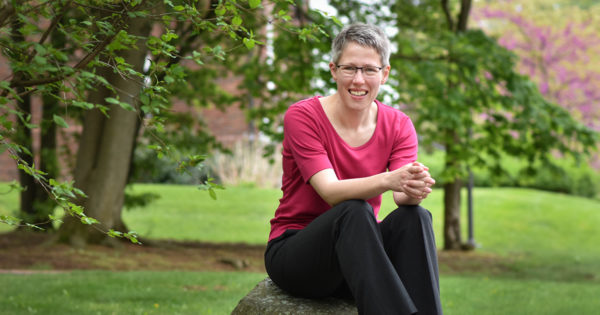Meet Our Summer Study Faculty Director, Katrin Fischer
Babson’s Summer Study program allows rising high school juniors and seniors to live like college students and learn like entrepreneurs. Working closely with our curriculum designer, the Summer Study Faculty Director helps to create engaging classroom learning environments with workshops, guest lectures, and more.
This year’s Summer Study Faculty Director is Katrin Fischer—a faculty member in the Arts and Humanities division, who has been passionate about education, teaching, and learning all her life. Constant learning and re-learning, she insists, are fundamental for success in today’s fast-paced and ever-changing world. “It’s a habit that needs to be practiced daily, and it’s a lot of fun.” Katrin practices what she preaches. She enjoys exploring topics inside and outside her discipline and making connections between them; she reads widely, takes time to learn new skills online (she is a fan of Lynda.com), and draws creative energy from hiking with her dog and playing the accordion.

Beyond the Wall
“An entrepreneur is an optimist; someone who sees the glass half full rather than half empty; someone who is willing to take risks, and if she fails, dusts off and starts afresh,” Katrin says, and her history reflects this definition. Katrin grew up in East Germany, where opportunities were limited. “One’s life followed a predictable path, and there was not much one could do about it.” This, however, changed in 1989 when the Wall came down. Katrin was a teenager then, and she remembers walking through the Brandenburg Gate, past the East German border control, into West Berlin as the beginning of a different life, one in which predictability was exchanged for the possibility to create her future. She went on to study English and German to be a high school teacher, spent a year abroad at the University of Sheffield, volunteered as a teaching assistant in a British Secondary School, and tutored in after-school programs. Later on, she worked in adult education while pursuing a PhD in American Literature. “American Studies perfectly combined my interests in literature, history, and languages. It also gave me an opportunity to delve deeper into the history of West Germany after World War II and gain a better understanding of the by then reunified Germany.”
Ethnography of a Business School
Katrin’s journey to business and entrepreneurship has been as unique as her transatlantic background. Before joining Babson in 2011, Katrin taught at various universities in Germany and, over here, at Bentley University. Teaching at business schools in the United States has been eye-opening and, in many ways, completely different from her previous teaching and learning experiences. “I found the business students fascinating, the context and culture intriguing, and the environment incredibly supportive. Having come from a strictly liberal arts background, I often had no clue what my business students were talking about,” she admits. Seeing an opportunity to satisfy her curiosity and to learn and grow herself, she took the plunge and enrolled in the MBA evening program at Babson. “Being a professor by day and a student at night was challenging and took me out of my comfort zone, but I grew in the process and gained understanding and appreciation for the business side of things.”
An Interdisciplinary Education
Katrin’s desire to explore “the unknown” led her down seemingly divergent paths. What seemed an exotic and rather incompatible combination at first—a Ph.D. in American Literature and an MBA from Babson—came together nicely. “The more I studied business, the more I realized how important the liberal arts are for a career in business. Arts and humanities and business overlap in fascinating ways, and learning becomes exciting when it focuses on these interdisciplinary intersections. One of the failures in the traditional education system is that it is still mostly separated by subject,” Katrin points out. “You have a class today in biology, then one in math, marketing, history, writing, etc.—all too often without much thought to how they all fit together.” Exploring the intersections between disciplines gives students a holistic understanding of not only business, but the world around them—“and it is much more fun for both teacher and student,” she adds.
Storytelling Is Everything
With the incoming Gen Z class worried about the ability to land a job with a stable financial future, focusing on arts and humanities may seem frivolous to some. Katrin argues that an interdisciplinary approach prepares students for the real world by giving them tools for dealing with increasing complexity. “Critical thinking, writing, and storytelling are among the top skills you should have,” she maintains. “If you cannot tell a compelling story, be it your own story or the story of your company, you cannot attract someone from the outside, nor can you internally hold things together.” Storytelling boils down to being able to explain, clearly and concisely, how humans position themselves in relation to their surroundings. As 128 students begin their journeys to Summer Study, Katrin hopes to encourage them to get into the entrepreneurial mindset. “I hope to encourage these students to explore, ask questions, and venture out of their comfort zones. Whether they actually become entrepreneurs in the end does not matter that much, because we all own at least one ‘business,’ and that is our life. We are entrepreneurs of our own lives!”
